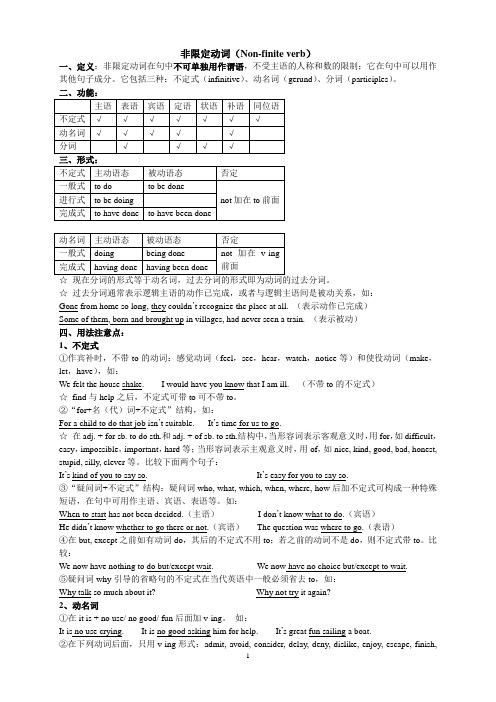英语中的非限定动词 (Nonfinite Verbs)讲解
非限定动词基本知识点

非限定动词(Non-finite verb)一、定义:非限定动词在句中不可单独用作谓语,不受主语的人称和数的限制;它在句中可以用作其他句子成分。
它包括三种:不定式(infinitive)、动名词(gerund)、分词(participles)。
二、功能:三、形式:☆现在分词的形式等于动名词,过去分词的形式即为动词的过去分词。
☆过去分词通常表示逻辑主语的动作已完成,或者与逻辑主语间是被动关系,如:Gone from home so long, they couldn’t recognize the place at all. (表示动作已完成)Some of them, born and brought up in villages, had never seen a train. (表示被动)四、用法注意点:1、不定式①作宾补时,不带to的动词:感觉动词(feel,see,hear,watch,notice等)和使役动词(make,let,have),如:We felt the house shake. I would have you know that I am ill. (不带to的不定式)☆find与help之后,不定式可带to可不带to。
②“for+名(代)词+不定式”结构,如:For a child to do that job isn’t suitable. It’s time for us to go.☆在adj. + for sb. to do sth.和adj. + of sb. to sth.结构中,当形容词表示客观意义时,用for,如difficult,easy,impossible,important,hard等;当形容词表示主观意义时,用of,如nice, kind, good, bad, honest, stupid, silly, clever等。
比较下面两个句子:It’s kind of you to say so. It’s easy for you to say so.③“疑问词+不定式”结构:疑问词who, what, which, when, where, how后加不定式可构成一种特殊短语,在句中可用作主语、宾语、表语等。
非限定动词汇总

10.1.1 非限定动词的含义和种类1)非限定动词(non-finite verb)作为动词的非谓语形式,不受主语的人称和数的限制,不能在句中做谓语,这是非限定动词与限定动词(谓语动词)的主要区别。
2)非限定动词没有语法上的主语,但往往有逻辑上的主语。
例 1 Experts hope to find a solution to the problem.专家们希望能找到解决这一问题的方法。
(不定式to find…的逻辑主语是句子主语experts。
)例 2 It would be difficult for the youth to understand this.要让年轻人理解这一点是会很难的。
(不定式的逻辑主语是theyouth)3)非限定动词有三种,即不定式(infinitive),动名词(gerund)和分词(participle)。
分词又有现在分词(present participle)和过去分词(past participle)两种。
10.1.2 非限定动词的性质非限定动词具有双重性质,即动词性质和非动词性质。
1)限定动词的动词性质表现在:非限定动词有时态和语态变化,有肯定与否定形式,可被状语修饰,可带宾语等。
2)非限定动词的非动词性质表现在:不定式和动名词具有名词性质,而分词具有形容词性质。
10.1.3 非限定动词的语法作用由于不定式和动名词具有名词性质,因此可在句中做主语、表语、定语、宾语和补语;另外不定式和介词+ 动名词还可做状语。
而由于分词具有形容词性质,因此可在句中做表语、定语、状语和补语,但不能做主语和宾语。
10.1.4 非限定动词短语及其复合结构由于非限定动词具有动词性质,因此可与表语、宾语、状语等修饰语连用,构成非限定动词短语,即不定式短语,动名词短语和分词短语。
非限定动词短语的逻辑主语可以是句子中的某一成分(如主语或宾语等),如10.1.1中的例1;而其本身也可以带逻辑主语,构成非限定动词复合结构,如10.1.1中的例2。
英语中的非限定动词 (Nonfinite Verbs)讲解35页PPT

21、要知道对好事的称颂过于夸大,也会招来人们的反感轻蔑和嫉妒。——培根 22、业精于勤,荒于嬉;行成于思,毁于随。——韩愈
23、一切节省,归根到底都归结为时间的节省。——马克思 24、意志命运往往背道而驰,决心到最后会全部推倒。——莎士比亚
25、学习是劳动,是充满思想的劳动。——乌申斯基
谢谢!
英语中的非限定动词 (Nonfinite Verbs) 讲解
51、没有哪个社会可以制订一部永远 适用的 宪法, 甚至一 条永远 适用的 法律。 ——杰 斐逊 52、法律源于人的自卫本能。——英 格索尔
53、人们通常会发现,法律就是样 一种的 网,触 犯法律 的人, 小的可 以穿网 而过, 大的可 以破网 而出, 只有中 等的才 会坠入 网中。 ——申 斯通 54、法律就是法律它是一座雄伟的大 夏,庇 护着我 们大家 ;它的 每一块 砖石都 垒在另 一块砖 石上。 ——高 尔斯华 绥 55、今天的法律未必明天仍是法律。 ——罗·伯顿
non-finiteverbs概要

非限定动词英语中非限定动词有三种:动词不定式、分词和动名词。
非限定动词在句中能充当谓语的一部分,但不能单独充当谓语,故又称非谓语动词。
它们的形式不随主语的人称和数的变化而变化,但仍具有动词的一般特征,可以带宾语。
一、非谓语动词时态、语态变化形式及其用法当非谓语动词所表示动作发生在谓语动词表示动作之前时,非谓语动词用完成时形式。
例:1)Having finished my homework, I listened to music for relaxation.当非谓语动词所表示动作与谓语动词所表示动作同时发生时,非谓语动词用进行时或一般时形式。
例:2)He pretended to be working hard when his mother entered his room.当非谓语动词所表示动作发生在谓语动词所表示动作之后时,非谓语动词用一般时形式。
例:3)I expect you to write to me.二、非限定动词的句法功能比较动词不定式(或不定式短语)具有名词、形容词和副词的性质,在句中能充当主语、表语、宾语、定语、补语或状语。
动名词(或动名词短语)具有名词形质,在句中常作主语、表语、宾语或定语。
分词(或分词短语)具有形容词和副词的性质,在句中可作表语、定语、补语或状语。
非限定动词的句法功能列表如下:1.动词不定式(短语)、和动名词(短语)作主语的区别1)当主语和表语都是非限定动词形式时,主语和表语的非限定形式要求一致。
例:①To live is to struggle. [正]②To live is struggling. . [误]③Living is to struggle. . [误]④Living is struggling. . [正]2)当主语为非限定动词,而表语不是的时候,不定式和动名词作主语都可以,意义有区别,但区别很小,可忽略。
区别在于:不定式强调动作性,常表示一次性、短暂的动作;而动名词倾向于名词性,常指多次重复的动作。
Nonfinite-verbs-(非谓语动词).doc1

Nonfinite verbs (非谓语动词)Ⅰ非谓语动词的特征1.非谓语:在句中能充当主、表、宾、定、状、补,唯独不能作谓语2.非限定:不受人称、数的限定3.保留一些动词的特征:⑴.与not 连用,构成否定式not to have done; not being invited⑵.可以带状语或宾语His failing the exam disappointed me.⑶.有着各种形式变化,如一般式、进行式、完成式、被动式等Ⅱ注意:非谓语动词的否定式:not 位于各种形式的最前面过去分词只有一种形式,及物动词表完成被动,不及物动词只表完成Ⅲ非谓语动词的句法功能Ⅳ动名词、不定式充当主语1.区别:动名词:不具体,时间性不强;不定式:具体,将来eg: ___________ is to learn. (teach)___________ is believing. ( see) (主表一致)___________ (find) a good job now is not easy.___________ (visit) the Summer Palace is the first step of the plan.2.复合结构动名词sb’s /sth’s doing sth.不定式for / of sb. to do sth.eg: • _______________________(玛丽来晚了) made her teacher very angry.• It is very important _______________________ (你掌握一门外语).注意:1) 动词不定式复合结构:It is good (nice, kind, wise, unwise, clever, silly, wrong, right, rude, stupid…)of sb. to do sth.2) 动名词复合结构3)It 形式主语:不定式:多用It seems impossible to refuse.动名词:少用It is no good / no use / useless doing sth.Ⅴ非谓语动词作表语1.区别:A. 动名词不具体,时间性不强不定式具体,将来• Their job is ___________ houses. (build)• Their work is ___________ the house. (build)B. 动名词:表对等关系,主语常为抽象名词,可互换位置现在分词:说明主语性质、特征,是限定关系,不可互换位置• My job is teaching ---- Teaching is my job.• The book is interesting. The scene is frightening.C. 现在分词:表性质、特征(常只有一般主动式)过去分词:表状态、特征(和主语构成动宾关系)• His speech is ______________• I'm much _______________ (inspire)• The meeting is _________(bore),so I feel very ______(tire)2. 常见表感情的分词1) amusing; astonishing; disappointing; exciting; frightening; interesting; moving; relaxing; satisfying;shocking; surprising; tiring; worrying; pleasing… (令人…)2)上述现在分词相应的过去分词(感到…)3.非谓语动词还可作其他系动词的表语:eg: He seemed to have worked it out. He got injured in the accident.Things remained unchanged. The story sounds amazing.EXERCISES1._____ is a good form of exercise for both young and old.A. The walkB. WalkingC. To walkD. Walk2._____ for the people is a glorious death.A. To dieB. DeadC. To be diedD. Being died3.To answer correctly is more important than _____.A. a quick finishB. to finish quicklyC. finishing quicklyD. finished quickly4.It is careless _____ the same mistake time and again.A. for you to makeB. of you to makeC. of you makingD. your making5.The door remains _____.A. lockingB. lockedC. closingD. to lock6. ---You look pale. ---I feel a little _____.A. tiringB. tiredC. tireD. tiresome7.You are our monitor. This is _____.A. for you to decideB. of you to decideC. your decidingD. you to decide8.He seems _____ here for 3 years.A. to be livingB. to have livedC. to liveD. having lived9.Her wish is _____ an engineer.A. becomingB. to becomeC. to be becomingD. become10.What I don’t like is _____.A. others’ shoutingB. they shoutingC. for them to shoutD. they shout11._____ pity on is taken for granted.A. The weak’s takenB. the weak being takenC. His being takenD. Tom’s taking12.Cleaning women in big cities usually get _____ by the hour.A. payB. payingC. paidD. to pay13.The difficulty is _____ in touch with them.A. to getB. how to getC. how gettingD. our getting14.---What’s made you so upset?--- _____ 3 tickets to the pop music concert.A. LostB. LosingC. Because of losingD. Since I lost15.As his business grows bigger, _____ will be part of his life.A. flight constantlyB. constant flyingC. flying constantlyD. to be flyingⅥ动名词和不定式作宾语1eg: • If you keep practicing speaking English, you can learn it well.• He devotes all his spare time to colleting stamps.2I'm learning to drive. √He knows how to drive √I'm learning how to drive. √ He knows to drive ╳eg: • she enjoys _____ (listen) to light music.• Would you mind _____ (go) on foot this evening?• Things keep _____ (change).• We are planning _____ (visit) Euro pe this summer.• Do you know _____ (operate) the machine?• He pretended _____ when I came in.A. readingB. to be readingC. to readD. being read3.跟动名词和不定式意义不同的词:⑴like, love, hate 区别不太大I hate lying. (不具体,时间性不强)I love to skate today. (具体)⑵remember, forge tHe must have forgot _____ (turn) off the light. It is still on. (去做某事)I remembered _____ (read) it in some magazine. (做过某事)⑶regret后悔作了某事,+动名词遗憾或抱歉要做某事,+不定式(tell, say, report, announce…)后悔没做某事,+动名词或不定式完成式的否定式I regret _____________________ (not study) hard when at college.I regret _________(say) that you are dismissed.⑷try to do sth努力做…try doing…尝试做…Let’s try ________(do ) it in another wayWe should try ________(get) everything ready in time.⑸begin, start一般情况下,两者皆可。
人教版高二英语非限定动词

一
概
说
非限定动词由于不能用作谓语,因而没有 非限定动词由于不能用作谓语, 语法上的主语,但它有逻辑上的主语; 语法上的主语,但它有逻辑上的主语;如: How can I get to know her? 不定式to 的逻辑主语是i) (不定式to know 的逻辑主语是i) I can’t bear him staying up so late. 动名词的逻辑主语是him 动名词的逻辑主语是him
二.不 定 式
2)用作表语;如: 用作表语; The important thing is to save lives 救人要紧 My chief purose has been to point out the difficuties of the matter. The import thing is to save lives.
二.不 定 式
有不少形容词(包括已变成形容词的分词) 有不少形容词(包括已变成形容词的分词) 可后接不定式,这种不定式也可叫做宾语; 可后接不定式,这种不定式也可叫做宾语; 如: I am very glad to see you 我见到你很高兴 We are sorry to leave. He is sure to come.
一.概 说
C)及物动词须有宾语;如: 及物动词须有宾语; To kill bugs,spray the area regularly bugs,spray 为了杀虫,请定期在地上洒药( 为了杀虫,请定期在地上洒药(及物动词不 定式To kill的宾语是 bugs) 定式To kill的宾语是 bugs) Have you any reason for saying such a thing? Saying的宾语是 Saying的宾语是such a thing 的宾语是such
第二节 非限定动词

(Non(Non-finite Verb)
• 定义: 定义: • 非限定动词(Non-finite Verb)是动词的非谓 非限定动词 是动词的非谓 语形式 • 它们不可以在句中单独作谓语,并且不受 它们不可以在句中单独作谓语, 主语的人称和数的限制
• • • •
种类: 种类: 不定式(Infinitive) 不定式 动名词(Gerund) 动名词 分词( 分词(Participle) )
• 3) try, remember, forget, propose, regret, stop, go on等后面接动名词或不定 等后面接动名词或不定 式时,意义差别明显。 式时,意义差别明显。如: • I remember reading the earthquake in the paper. 我记得我在报纸上读过有关这 次地震的报道。 次地震的报道。 • I’11 remember to phone him. 我会记得给 他打电话
• 4) 动词 动词need, require, want作“需要”解 作 需要” 时 , 宾语要求用动名词的主动语或不定式 的被动语态。 还有, 动词deserve( 理应 的被动语态 。 还有 , 动词 ( 理应/ 活该受到)的用法也一样。 活该受到)的用法也一样。如: • All the rooms here are dirty. They need cleaning/to be cleaned这儿所有的房间都 这儿所有的房间都 脏了,得把它们打扫干净。 脏了,得把它们打扫干净。
• 1) like, date, prefer等词后,若表示一般倾 等词后, 等词后 多用动名词; 向 , 多用动名词 ; 若表示特定的具体的行 多用不定式。 为,多用不定式。如: • would you like to come with me or would you prefer to stay here?
英语中的非限定动词 (Nonfinite Verbs)讲解共35页

60、生活的道路一旦选定,就要勇敢地 走到底 ,决不 回头。 ——左
英语中的非限定动词 (finite Verbs)讲 解
11、获得的成功越大,就越令人高兴 。野心 是使人 勤奋的 原因, 节制使 人枯萎 。 12、不问收获,只问耕耘。如同种树 ,先有 根茎, 再有枝 叶,尔 后花实 ,好好 劳动, 不要想 太多, 那样只 会使人 胆孝懒 惰,因 为不实 践,甚 至不接 触社会 ,难道 你是野 人。(名 言网) 13、不怕,不悔(虽然只有四个字,但 常看常 新。 14、我在心里默默地为每一个人祝福 。我爱 自己, 我用清 洁与节 制来珍 惜我的 身体, 我用智 慧和知 识充实 我的头 脑。 15、这世上的一切都借希望而完成。 农夫不 会播下 一粒玉 米,如 果他不 曾希望 它长成 种籽; 单身汉 不会娶 妻,如 果他不 曾希望 有小孩 ;商人 或手艺 人不会 工作, 如果他 不曾希 望因此 而有收 益。-- 马钉路 德。
56、书不仅是生活,而且是现在、过 去和未 来文化 生活的 源泉。 ——库 法耶夫 57、生命不可能有两次,但许多人连一 次也不 善于度 过。— —吕凯 特 58、问渠哪得清如许,为有源头活水来 。—— 朱熹 59、我的努力求学没有得到别的好处, 只不过 是愈来 愈发觉 自己的 无知。 ——笛 卡儿
- 1、下载文档前请自行甄别文档内容的完整性,平台不提供额外的编辑、内容补充、找答案等附加服务。
- 2、"仅部分预览"的文档,不可在线预览部分如存在完整性等问题,可反馈申请退款(可完整预览的文档不适用该条件!)。
- 3、如文档侵犯您的权益,请联系客服反馈,我们会尽快为您处理(人工客服工作时间:9:00-18:30)。
非限定动词有语态和时态的变化。
语态
时态 一般式 进行式 完成式 一般式 完成式 一般式
主动
被动
动词不定式
to do to be doing to have done doing having done /
现在分词, 动名词 过去分词
to be done / to have been done being done having been done done
4). 用些动词后面用动名词和不定式所表示的意思不一样, 动名词表示动作已发生,不定式表示动作尚未发生。如: remember , forget, regret…例如: I remember locking the door.(“记得已经……) Please remember to lock the door when you leave.(别 忘……) 说明:need, want, require等表示 “需要”意义时, 其后 的宾语用动名词的主动式表示被动含义,或用不定式的被 动式。例如: The shoes need mending / to be mended. These young trees want watering / to be watered. The wounded soldier requires looking after / to be looked after.
3.作宾语 不定式与动名词作宾语的用处较广,其区别也较 复杂,下面分几种情况进行比较: 1). 有些动词后面,既可以用不定式也可用动名词。 不定式表示某次具体的动作,动名词表示的经常性、 习惯性的动作。如:begin, start, continue, fear, like, dislike, love…例如: I like playing tennis, but don’t like to play it in such hot weather. 2). 有些动词后面用动名词。如:admit, advise, appreciate, avoid, can’t help, consider, delay, excuse, enjoy, escape, finish, imagine, keep (on), mind, practice, suggest, understand, forgive, miss, risk, can’t stand, permit…例如:
非限定动词的语态和时态的应用分述如下: 1.不定式 I hope to get an English dictionary. (之后) The children helped the old woman clean the house. (同时) I’m glad to hear that he has arrived. (之前)
所以,凡表示“令人……的”都是-ing形式,凡是表示 “感到……”都用-ed形式。换句话说,若人因……而引起 心理变化用-ed,若是人、物本身具有的性质用-ing。这类 词常用的有: interesting 使人感兴趣的 interested 感兴趣的 exciting 令人激动的 excited 感到激动的 delighting 令人高兴的 delighted 感到高兴的 disappointing 令人失望的 disappointed 感到失望的 encouraging 令人鼓舞的 encouraged 感到鼓舞的 pleasing 令人愉快的 pleased 感到愉快的 puzzling 令人费解的 puzzled 感到费解的 satisfying 令人满意的 satisfied 感到满意的 surprising 令人惊异的 surprised 感到惊异的 worrying 令人担心的 worried 感到担心的
英语中的非限定动词 (Nonfinite Verbs)
非限定动词的特点: 1.非限定动词没有人称和数的变化。比较: He likes to play football. They like to play football. 2.如果非限定动词是及物动词,须有宾语。如: I get up early to read English in the morning. I suggest having a meeting. 3.非限定动词可以有状语修饰。如: I prefer to go there by bike. Excuse me for coming late.
They are said to be building a bridge.(同时) I wish to be studying in the same school with you.(之后) She seemed to have heard about it yesterday.
: She doesn’t like to be praised in public. The book is said to have been translated into English. 1).在too / enough…to 的结构中。如: The suit is too large to wear. The bed is big enough to lie on. 2).在there be 的结构中。如: There is a lot of work to do. 亦可用There is a lot of work to be done.
2.作表语 不定式和动名词作表语时的区别类同与它们作主语 时的区别。如:My job is to teach you how to swim. My job is teaching English. 说明:当表语是不定式时,主语也用不定式;当表语 是动名词时,主语也用动名词。如: To see is to believe. = Seeing is believing. 分词作表语相当于形容词,现在分词多指主语的性质, 过去分词说明主语的状态。如: The news looks quite encouraging. She got excited about the result of the experiment. 说明:1.一般来说,表示心理状态的动词如 excite ,interest 等都是及物动词,汉语意思不是“激 动”,“高兴”,而是“使激动”,“使高兴”,因而 现在分词应该是“令人激动的”, “令人感兴趣的”, 过去分词则是“感到激动的”,“感兴趣的”。
If you want to improve your spoken English, you should often practice speaking English. 3)有些动词后面用不定式。如:wish, hope, manage, ask, offer, promise, pretend, decide, learn, agree, care, choose, determine, expect, afford, arrange, attempt, beg,, dare, demand, desire, fail, long, prepare, refuse… 另外,tell, show, teach, find out, decide, discuss, learn 等 动词常用“连接代词/ 副词+ 不定式”结构作宾 语。如: He offered to help us. They will tell us how to repair farm tools.
过去分词表示在谓语动作之前发生的动作, 本身有被动的含义,所以只有一般式没有 完成式。如: The meeting held yesterday is very important
3.动名词 动名词的时态分一般式和完成式两种,如果动 名词的动作没有明确地表示出时间是与谓语动 词同时发生或在谓语动作之前发生,用动名词 的一般式。如: Most boys are interested in playing basketball. 如果动名词的动作发生在谓语动词所表示的动 作之前,通常用动名词的完成式。如: I am sorry for having kept you waiting for such a long time.
当动名词的逻辑主语是动名词所表示动作的承受者 时,用动名词的被动式。如 Everybody dislikes being laughed at. You can not enter the office without being asked.
四.非限定动词的语法功能
不定式 分词 动名词
主 语 √
√பைடு நூலகம்
表 语 √ √ √
宾 语 √
介 宾
宾 补 √ √
√
√
定 语 √ √ √
状 语 √ √
1. 作主语 不定式和动名词都可以作主语。不定式作主语 往往表示具体的、将来的或一次性的动作;动名词 作主语表示一般的或抽象的多次性行为。如: To scold her would not be just. Reading aloud is very important in learning a foreign language. 在很多情况下可以用“it” 作形式主语,把真正的 主语移到后面。如: It is not an easy thing to master a language. It’s a waste of time quarreling about it.
2分词作表语时,在形式上与进行时态或被动语 态一样,但意义上是有区别的。比较:
The film is moving . 这电影动人。(表语, 说明主语的性质) They are moving next Sunday.。他们下周日 搬家。(现在进行时,表示动作)
The bookstore is now closed.书店现在关门了。 (表语,说明主语现在所处的状态) The bookstore is usually closed at 7:30 p.m.. 书店通 常在下午7:30关门。(被动语态,表示动作)
